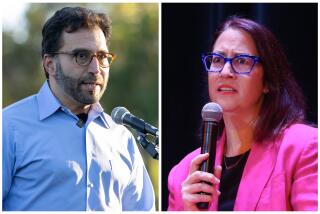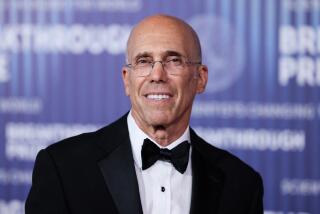Dannemeyer Sees Senate Bid as Vanguard of a Revolution : Politics: Ex-congressman doggedly advocates religious recipe for solutions to national problems.
- Share via
SAN DIEGO — The morning was for prayer and politics, and to many of the Good Friday worshipers kneeling before a towering hilltop cross in the chilly coastal fog, there is little difference.
As former congressman William E. Dannemeyer told the nodding listeners, there is no such thing as separation of church and state in America. That is a perversion of the Constitution committed by atheist national leaders and a misguided U.S. Supreme Court, he said.
“The ACLU is working like termites, burrowing into our culture to undermine what our Founding Fathers gave us over 200 years ago,” the lanky grandfather said. “George Washington, the first President of the United States, said, ‘Let us with caution indulge the supposition that morality can be maintained without religion.’ ”
The cross on Mt. Soledad overlooking La Jolla Cove has been a flash point in Dannemeyer’s fight against religious censorship ever since a judge declared it was inappropriate for a public park. But the crowd on this morning numbered fewer than 20 people.
If Dannemeyer was disappointed, though, it did not show. In his second consecutive bid for California’s Republican U.S. Senate nomination, this time seeking the seat held by Democrat Dianne Feinstein, the former seven-term congressman from Orange County has come to know small crowds.
It is one reason his critics have often written his political obituary, convinced that his religious-right preachings and anti-homosexual attacks are out of step with the electorate. In 1992, even many of his supporters figured his career was over when he lost nearly 2 to 1 in a GOP primary against appointed U.S. Sen. John Seymour.
“His political positions are so extreme as to make him laughable and irrelevant to the debate,” said Robert Nelson, an Orange County Republican political consultant. “For all of California’s other follies, it would be a highly unusual circumstance to elect a religious fanatic to statewide office.”
But if there is one thing about the 64-year-old Dannemeyer that all sides will agree on, it is his obstinate--if not obsessive--commitment to pursue his religious recipe for solutions to political problems.
He does not stop when his issues become politically unpopular. He does not stop when critics laugh him off as a wacky amusement. And he does not even stop when friends counsel him to assume the role of a senior conservative statesman instead of a recycled Senate candidate.
“Dannemeyer the Rock--the last honest man,” said Rep. Robert K. Dornan (R-Garden Grove), a conservative soul mate and supporter. “He is a guy who would stand up and speak his mind for the good of the country without being worried about being punished by pollsters or in the next election. That gets around in the Republican universe.”
The same constancy runs through Dannemeyer’s personal life. Dannemeyer at home is the stolid and doting head of a traditional suburban family.
He and his wife, Evelyn, have lived in Fullerton since 1957, just a few miles from the home in South Gate where Dannemeyer was raised by his German immigrant parents. He still attends the same Lutheran church where his two daughters and one son--now the parents of eight Dannemeyer grandchildren--were baptized. And he is financially comfortable today largely because of the rent he still collects on local properties he bought about 30 years ago.
“At home, he wasn’t the politician that most people know him as; he was our dad,” said Dannemeyer’s son, Bruce, an Orange County attorney. “I think he was a good father figure. He clearly was the authority in the family, not in an authoritarian way, but by rules lovingly applied. . . . He was very devoted to the family.”
Dannemeyer’s major opponent in the June 7 GOP primary is a wealthy Santa Barbara congressman, Michael Huffington, who will spend millions more than Dannemeyer for campaign consultants and statewide television commercials.
In contrast, Dannemeyer’s long-shot effort is a mom-and-pop bandwagon. If anything, however, Dannemeyer runs hardest upstream. As he writes in a mission statement for his campaign, quoting Gen. George Patton, “In every battle, there comes a time when both sides consider themselves beaten. He who then continues to attack, wins.”
Dannemeyer’s reason for running against Huffington is the same one he gave for challenging Seymour two years ago. He believes his opponent’s socially moderate views are morally wrong and they provide voters with little reason to replace a politically similar Democrat.
Dannemeyer believes his campaign is in the vanguard of a growing spiritual revolution in America. If his effort is sometimes a lonely one, he is undeterred. Turning to the Bible, he says, is the only way the nation can avert disaster and solve its pressing problems of crime, poverty and a shabby education system.
“There is no mystery about crime’s basic cause,” he tells audiences in private homes, restaurant banquet rooms and public halls throughout California. “It is simply man’s rejection of God’s laws.”
Although he is sure the spiritual revolution is coming, Dannemeyer believes it will be a long-term struggle. After all, he charts the decline in America’s moral values as starting with a 1947 Supreme Court decision establishing the separation of church and state and culminating in the nihilism of the 1960s.
But he notes a growing acceptance in today’s political dialogue that many of the nation’s problems are traced to a decaying value system and family structure. Dannemeyer’s supporters say the change is evidence of his political acuity and a vindication of his mission.
“If it were not for people like Bill Dannemeyer, our country would be in way worse shape than it is now, and that seems impossible,” said Sara Hardman, California director of the Christian Coalition, a national organization that grew out of Pat Robertson’s 1988 presidential campaign.
“We need more people like Bill Dannemeyer, who not only have beliefs in the people and our country, but are willing to go out there and take the hits--to be called extreme and to be called weird things,” she said.
In campaign speeches this year, Dannemeyer warns his listeners that the dangers they face are far more serious than just ignorance or apathy toward religion. He casts the United States as a battleground where Christians are under attack by atheist leaders in government, media and business.
The debate over the cross on Mt. Soledad and the fight to allow voluntary prayer in schools are examples of the struggle, he said. But, in an interview, Dannemeyer also suggests that the followers of cult leader David Koresh in Waco, Tex., last year were murdered by government agents partly because of their religious beliefs.
“I don’t think that is far-fetched for a government that reflects what our Supreme Court has done to our heritage in the last half-century,” he said. “I believe that the wrong people were in the criminal dock in Waco. I believe the (federal) agents were the ones who should have gone on trial there.
“The Mafia, to my knowledge, has never killed women and children,” he added. “Agents of the U.S. government did.”
As one of Washington’s most outspoken conservatives during his congressional career, Dannemeyer has periodically shocked Beltway insiders with controversial remarks. In 1990, Dannemeyer objected to Nelson Mandela’s speech to a joint session of Congress, saying the South African leader was a terrorist more comparable to Willie Horton--the convicted black murderer who raped a woman while on a weekend furlough and was featured in a notorious commercial during the 1988 presidential campaign--than to Martin Luther King Jr.
But his national reputation evolved largely during the 1980s because of his role as an outspoken critic of homosexuals and the author of several controversial proposals regarding AIDS.
The congressman twice sponsored unsuccessful ballot propositions to require that state health officials compile names of AIDS carriers and remove them from some jobs. He also sparked an outcry when he once suggested that AIDS carriers emit contagious spores, a claim he quickly dropped. And in 1989, a House colleague called for an ethics investigation of Dannemeyer when he read into the Congressional Record a graphic description of gay sex acts.
That same year, Dannemeyer authored a book called “Shadow in the Land: Homosexuality in America,” which examines scientific studies about sexual preference as a choice and interprets biblical passages as a condemnation of homosexuality.
The book argues that there is a dangerous homosexual movement in the nation that is conspiring to destroy religious institutions and ruin America.
Many of Dannemeyer’s critics, including some Republicans, say his preoccupation with homosexuality has isolated him in the party. As one prominent conservative activist said: “He’s respected, everybody likes him, and if you get him off the subject of homosexuals, he’s a real easygoing guy.”
That may be one reason Dannemeyer has not emphasized the issue during his Senate race, focusing instead on family values and economics. As a moral issue, Dannemeyer said he still considers homosexuality to be one of the “battlegrounds in the cultural war.” But he believes there are more pressing issues for the campaign.
Naturally, Dannemeyer is a target for California’s homosexual community, where some leaders dismiss him as an extremist and others warn that he is a dangerous provocateur.
Frank Ricchiazzi of the Log Cabin Club, a gay Republican organization, said he believes Dannemeyer’s agenda is actually a calculated effort to raise money through fear-mongering.
“Scare tactics is a great way to make money,” Ricchiazzi said. “He will not go away. He is lacking something in himself and . . . he wants to be the bad boy so people will pay attention to him.”
As a congressman, Dannemeyer had his victories, although he acknowledges frustration with the inherent difficulties faced by a minority House member.
He recalls fondly the years after President Ronald Reagan’s 1980 election as a time when conservatives felt that the power to change the world was within their grasp. But that feeling was temporary and, later, many of Dannemeyer’s proposals became more symbolic than influential.
For eight years in a row, Dannemeyer offered an alternative budget package that he contends would have eliminated the deficit and cut taxes at the same time. He also rose to be the ranking minority member of the House Energy and Commerce Committee, where he was a constant antagonist to the chairman, Rep. Henry Waxman (D-Los Angeles). When the committee debated a landmark clean air bill, Dannemeyer proposed an anti-pornography amendment that he described as “airwave emission standards.”
But Dannemeyer the Rock continued to battle, and he did succeed on several key fronts. He was at the forefront of the fight that reduced funding for the National Endowment for the Arts after critics complained that taxpayers should not be forced to finance controversial works.
In 1989, he also succeeded in passing strict guidelines on dial-a-porn services. And he forced a roll call vote on a congressional pay raise--which he opposed--that was a death knell for the idea. “That doesn’t exactly endear yourself to your peers,” he said.
Dannemeyer had enough of his own money at the time that he did not rely on his congressional salary. But his regular denunciation of political perks is a reflection of the immigrant work ethic he learned during a Depression-era childhood.
At age 9, Dannemeyer got a job to help the family because his father suffered from epilepsy and had been committed to a sanitarium years before. Both of his parents were born in Germany and passed through Ellis Island on their way to Los Angeles, where they met. Before his illness, Dannemeyer’s father was a chicken-feed salesman in South Gate. Dannemeyer’s mother later raised two children on her pay as a cleaning woman.
He eventually put himself through Valparaiso University, a private Lutheran college in Indiana, and later graduated from Hastings College of Law in San Francisco. He served in the Army during the Korean War as a counterintelligence officer in Europe, usually doing background checks on federal employees or protecting anti-communist witnesses.
On his return to the United States, he married a Lutheran minister’s daughter, Evelyn Hoemann.
Over the years, Dannemeyer’s law practice and his real estate investments have proved lucrative. His last financial disclosure statements from Congress in 1992 indicate an income from rental properties of at least $200,000 per year.
Dannemeyer said he does not yet receive Social Security. But in addition to the rental income, he does get two government checks every month--pensions from Congress and the state Legislature.
Dannemeyer began his political career in the state Assembly when he was elected as a Democrat from Fullerton in 1962. But he said he has always been a conservative, and switched to the Republican Party when Democrats took a liberal turn in the 1960s by promoting the welfare system.
Dannemeyer served three terms in the Assembly before taking a 10-year political hiatus while his children were young. He returned to the Assembly as a Republican for one term in 1976, then won election to Congress in 1978.
In 1992, Dannemeyer sacrificed his seat in the House so he could face Seymour in the U.S. Senate race. The race lasted just a few months. But, afterward, Dannemeyer never really gave up the campaign, maintaining a speaking tour before groups throughout California.
For his latest U.S. Senate race, Dannemeyer has fashioned a set of proposals addressing the key issues of 1994. Typically, however, the latest package includes some that are unconventional, controversial and, most likely, politically impossible.
On crime, for example, Dannemeyer proposes armed-citizen patrols to supplement the police. Citizens should be trained in the use of weapons, he says, but he admits the patrols could lead to the mistaken shooting of innocent victims.
On prisons, Dannemeyer says the state should study the cost effectiveness of housing U.S. criminals in financially strapped Third World nations.
On the environment, Dannemeyer decries the Endangered Species Act’s disruption of commerce. Quoting an early American forest officer, he wrote, “The object of our forest policy is not to preserve the forests . . . but for the making of prosperous homes.”
Many of these proposals leave critics shaking their heads. But to his allies, he is a lone voice of reason in the political wilderness.
“He has been criticized for the manner in which he stands by an issue and his persistence in remaining true to that issue, but in my mind, that is what sets him apart and that’s what motivates him,” said Dannemeyer’s son, Bruce. “He is a role model to see that you can be true to your beliefs and be in politics and pursue issues that are important to you because they are important to you, not because they will line your pocket.”
Profile: William E. Dannemeyer
* Born: Sept. 22, 1929
* Residence: Fullerton
* Education: BA, Valparaiso University in Indiana, 1950; JD, University of California Hastings School of Law, San Francisco, 1952.
* Career highlights: U.S. Army, counterintelligence officer; Fullerton deputy district attorney, 1955-1957; Fullerton assistant city attorney, 1959-1962; assemblyman, 1963-1966, 1976-1977; U.S. congressman, 1979-1993.
* Hobbies: Fishing
* Family: Wife, Evelyn. Three adult children, eight grandchildren.
* Quote: “Our laws and institutions must necessarily be based on the teachings of the redeemer of mankind. It is impossible that it should be otherwise. . . . Our state and our institutions are emphatically Christian. This is a religious people. You can’t get any clearer than that.”
More to Read
Get the L.A. Times Politics newsletter
Deeply reported insights into legislation, politics and policy from Sacramento, Washington and beyond. In your inbox twice per week.
You may occasionally receive promotional content from the Los Angeles Times.










